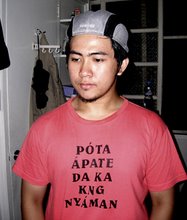After the successful Taiwanese TV drama ‘Meteor Garden’ of ABS-CBN and the not-so-successful ‘My MVP Valentine’ of GMA-7, the latter network put the first Koreanovela (how Korean TV dramas are called in the Philippines) on primetime: ‘Lavender.’ From then on, Koreanovelas have penetrated Pinoy culture well—from ‘Jewel in the Palace’ to ‘Lovers in Paris,’ ‘from ‘Winter Sonata’ to ‘My Name is Kim Sam Soon.’
I was able to try Korean food when we went to the US in Summer 2005. We went there through Asiana Airlines, the stewardess of which served either Korean food or Western food for their meals. My mother and big brother would choose “itang balu da na,” while I, the hard-headed and adventurous Laxamana boy, insisted on trying what Koreans had to offer when it comes to dining. After all, it’s not everyday that you get to try Korean food. If it tastes awful, then charge it to experience. But fortunately, I loved it! Kimchi didn’t taste good at first but I have learned to love it, in spite of my mother wanting to puke at the smell of it.
Our stopover was in Incheon, South Korea, and we were to stay there for 10 hours. I liked the place. It was cold. It was clean. I couldn’t get over the idea that South Korea used to be poorer than the Philippines. It was hard conversing using English with the natives working at the airport, but they were friendly enough.
The airline company offered two choices for us to spend our 10 hours: take a short Korean tour, or take a rest at a Korean hotel. I wanted a tour, but my company wanted to rest. What a waste of opportunity! It’s not everyday that we get to stay for 10 hours in South Korea.
In college, I was introduced to Korean films in my Film 100 class, where the professor recounted how the film industry of South Korea developed, to the point of making a global wave in a decade’s span. I then grabbed hold of Korean war films like ‘Taegukci’ and romance films like ‘Il Mare,’ and I must say kudos. The unpretentious support of the government contributed highly to the development of Korean entertainment, so said my professor.
In one of my Broadcast Communication class, Music in Media, we had one Korean classmate. I already forgot his name, but I still remember our encounters with him. He was always bringing with him an electronic Korean-English dictionary which he would consult often when he couldn’t remember the appropriate English words to express his remarks. It was amusing, really. I had the chance to have him as a group mate, and his linguistic and cultural struggles didn’t make him less participative. He was indispensable in class. In fact, when deciding for the photo theme of our CD project inlay, he came up with this very artistic idea of fusing classical music flavor with stinking toilets, which to me was very fresh, but to my conservative professor was, well, stinking.
In my college life, more and more students were trying to enlist in Korean language subjects, learning how to write Hanggul and learning basic Korean sentences, phrases, and expressions. Angeles City nowadays also celebrate Choo-Seok festival for the people in that Korean avenue called Friendship, the Korean signboards of which, I think, outnumber the Kapampangan signboards present in the city. In Cebu, they have this Cebuanovela titled ‘Saranghe’ (‘Kaluguran Da Ka’ in Korean), which features a love triangle—two boys and a girl. One of the boys is Korean.
Evidently, Koreans, as well as other Asians, own this decade, and the future is teeming with grander Asian possibilities. I just wonder when the Philippines and other Austronesians will take part.
Korean Singers in the US
Three big Korean entertainers are attempting to conquer US after conquering much of Asia. They are none other than Rain, famous in the Philippines for the Koreanovela ‘Full House’ and that shampoo commercial with a popular line ‘My name is Rain’; Se7en, another Justin Timberlake-like South Korean RnB crooner who is not yet known in the Philippines but is celebrated throughout Asia; and BoA, a multitalented girl who can sing, dance, sing in many languages, and who has a beautiful face and body to flaunt.

BoA has already debuted in the US, but I haven’t heard whether she’s successful. Her debut US debut music video looked like the typical Britney Spears or Beyonce music videos, only with the English lyrics being sung with Asian accent.

Rain’s debut and a lot of concerts have been postponed due to trademark conflicts, while Se7en’s debut is, in my opinion, the most watched out for, as the production team of his US debut album consists of big people who contributed to the success of big US names like Beyonce, Black Eyed Peas, Madonna, Fergie, etc. His first single would be ‘Girls’ featuring Lil’ Kim. The song was produced by Darkchild.

In a newspaper article, Will.i.am of the Black Eyed Peas opined that he sees no reason as to why Korean entertainers couldn’t make it big in the US. If American singers can make it big in other places, why not the other way around?








No comments:
Post a Comment